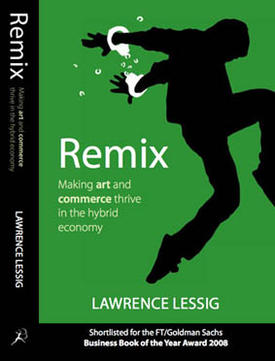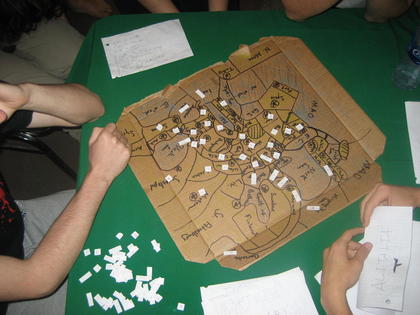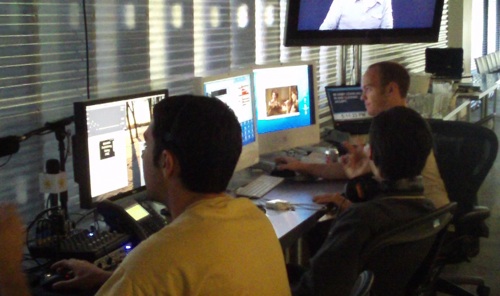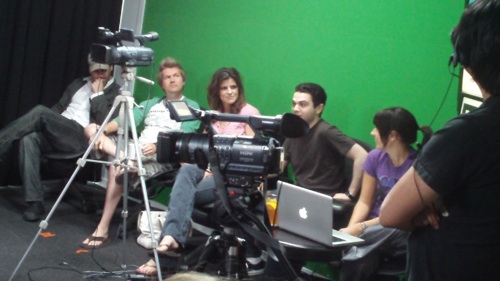The Latest from Boing Boing |  |
| Posted: 01 May 2009 03:11 AM PDT  These lovely, betentacled tables were designed by Chul An Kwak, a Korean designer who exhibited them back in 2007 at the Seoul Design Week. Chul An Kwak at Seoul Design Week 2007 (via Neatorama) | |||||||||||
| Bloomsbury edition of Lessig's REMIX goes CC Posted: 30 Apr 2009 11:18 PM PDT | |||||||||||
| Posted: 30 Apr 2009 10:41 PM PDT Rose sez, "Shatnerquake is a book by Jeff Burk, available now from independent publisher Eraserhead Press who specializes in publishing bizarro cult fiction." William Shatner? William Shatner. William Shatner! | |||||||||||
| Kids' Diplomacy board made out of a pizza box Posted: 30 Apr 2009 10:38 PM PDT Ken sez, "Kids on a school trip to Costa Rica made a Diplomacy board out of a pizza box:" Diplomacy is Fun Leadership Training (Thanks, Ken!) | |||||||||||
| Android app uses G1 compass as a metal-detector Posted: 30 Apr 2009 10:35 PM PDT Here's a little Android mobile phone app that turns your handset into a metal-detector, using the compass as a magnetometer. Not super-accurate or sensitive, but possibly useful for grubbing in the beach looking for your car-keys. | |||||||||||
| US Trade Rep lies about Canadian piracy Posted: 30 Apr 2009 10:29 PM PDT The US Trade Representative is once again trying to pressure Canada into adopting a version of the Digital Millennium Copyright Act (a 1998 US law that's enabled rightsholders to sue tens of thousands of music fans as well as technology companies, without having any effect on downloading). The strategy is the same as last time, putting Canada on the "Priority Watch List" of countries that are soft on pirates. Now, you may say that the US has no business telling Canada what sort of copyright laws it should have, and you'd be right. But as Michael Geist points out, the idea that Canada is a pirate nation is just wrong -- even using the US copyright lobby's own numbers, Canada is a model citizen. The Absurdity of the USTR's Blame Canada Approach | |||||||||||
| Why neutrality is more important than connection speeds Posted: 30 Apr 2009 10:24 PM PDT David Isenberg's posted the text of "Broadband without Internet ain't worth squat," a speech he gave to the Broadband Properties Summit this week, arguing that the most salient characteristic of the Internet is that it allows anyone to deploy any app or service, and that we lost that when we concentrate on making it "broadband" or what-have-you. This talk is a 30,000-foot view of why our work is important. I'm going to argue that the Internet is the main value creator here - not our ability to digitize everything, not high speed networking, not massive storage - the Internet. With this perspective, maybe you'll you go back to work with a slight attitude adjustment, and maybe one or two concrete things to do.Broadband without Internet ain't worth squat | |||||||||||
| White tea contains anti-obesity substances Posted: 30 Apr 2009 05:23 PM PDT BioMed Central's Nutrition and Metabolism journal published the results of a study at Beiersdorf AG that found that an extract of white tea inhibits the growth of new fat cells and and breaks down the fat in existing fat cells. After treating lab-cultured human pre-adipocytes with the tea extract, the authors found that fat incorporation during the genesis of new adipocytes was reduced. According to Winnefeld, "The extract solution induced a decrease in the expression of genes associated with the growth of new fat cells, while also prompting existing adipocytes to break down the fat they contain."White tea -- the solution to the obesity epidemic? | |||||||||||
| Girls Against Girls: Why We Are Mean to Each Other and How We Can Change, by Bonnie Burton Posted: 30 Apr 2009 05:10 PM PDT  Our friend Bonnie Burton Burton has a terrific new book out called Girls Against Girls: Why We Are Mean to Each Other and How We Can Change. In it, Bonnie explains the "mean girl" syndrome, and why even nice girls sometimes can be mean to other girls. I'm saving it for my daughters. Written for all teen girls, this insightful book discusses different types of girl-on-girl cruelty, why it happens, and how to deal with it. With details on various forms of abuse common between girls—including betrayal between friends, cyberbullying, hazing, and the silent treatment—this useful guidebook will help teen girls understand why they show aggression to each other, cope with difficult situations, gain confidence, and work together as teams, while also suggesting when to get help from adults when situations get out of hand. It includes quotes and inspirational stories from famous role models who have had firsthand experience with girl meanness, such as Jane Wiedlin, founding member of the Go-Go's; Jenny Conlee, bandmember of The Decemberists; and Tegan, bandmember of Tegan and Sara.Girls Against Girls: Why We Are Mean to Each Other and How We Can Change | |||||||||||
| Posted: 30 Apr 2009 01:57 PM PDT Seattle artist Kim Graham made herself a pair of horsey legs, and now she's making more to sell. They'll cost you about $1000 with the optional spring loaded hooves. | |||||||||||
| Posted: 30 Apr 2009 01:41 PM PDT | |||||||||||
| Making better panhandling signs for a homeless man Posted: 30 Apr 2009 01:19 PM PDT  The Mt Holly Mayor and his friend made some signs for a fellow named Ed who is out of work. Ed says the signs are working! My pal, and frequent Mt. Holly tourist, Todd Norem (noremipsum.com) created these media appropriate and proven effective outdoor boards for his client Ed who reported at least a 800% increase in gross income on days his media ran.See other signs at the link. Pan Handling Competition is Running Hot in Minneapolis | |||||||||||
| Using a blog to find help for a homeless family in San Francisco Posted: 30 Apr 2009 01:18 PM PDT Danny sez, "Blogger Julie of TangoBaby was walking past a begging homeless woman, K, and her two kids in San Francisco, agonising about how she couldn't do anything to help -- when she realised she could. She wrote up the story of the family, took photos, and started telling their story on her blog. Now she's working with her readers to get a fair deal for K in SF's bureacratic system for handling the homeless in the city, and recording the troubles and opportunities they're having on the way." K's Story and YOU CAN HELP! (Thanks, Danny | |||||||||||
| Free Comic Book day this Saturday! Posted: 30 Apr 2009 11:51 AM PDT Free Comic Book Day (Thanks, Eyal!) | |||||||||||
| Godaddy: Don't Buy dot-TV Domains, The Island is Sinking. Posted: 30 Apr 2009 11:33 AM PDT  If I'm reading the pop-up window correctly, domain registrar Godaddy recommends against purchasing .tv domain names because the island of Tuvalu, which the domain represents, is sinking. One more reason not to get bent out of shape over the fact that CNN bought "boingboing.tv" out from under us back in 2007. (via Eddie Codel) | |||||||||||
| Car Culture and the Fate of the "Urban Manatee" Posted: 30 Apr 2009 11:25 AM PDT Maggie Koerth-Baker is a guest blogger on Boing Boing. A freelance science and health journalist, Maggie lives in Minneapolis, brain dumps on Twitter, and writes quite often for mental_floss magazine. As we all learned in preschool, Muppets are native to New York City, and once freely roamed (in a floppy, yet oddly stiff-limbed sort of way) the whole of the five boroughs. Sadly, those days have passed. But now, kindly urban planning wonks are hoping that new, livable-streets initiatives can help the good old days return. In the early part of the 1900s, Zozos - large, furry, innocent, purple creatures - once freely roamed New York City's streets, and were seen frequently mingling among its denizens and enjoying the public realm. But with the advent of the automobile their numbers slowly dwindled, until the 1930s when sightings became rare and they were thought to go extinct. But now thanks to a burgeoning livable streets movement and a marked improvement in public spaces in NYC, Zozo sightings have been reported. World-renowned crypto-zoologist Donald Druthers has convinced us to document the facts - and yes, it looks like Zozos could be making a comeback! See the evidence for yourself." | |||||||||||
| French film-makers and science fiction writers protest new anti-P2P law Posted: 30 Apr 2009 09:15 AM PDT Alan sez, "Thought you'd be interested in the following two documents, which I've translated from French, concerning the debate over the anti-p2p 'Hadopi' law in France [Ed: this is the "three strikes" law that would allow copyright holders to have your network connection cut by accusing you of three infringements, without having to show any proof. The law was defeated earlier this month, but is back for another kick at the can]. I think it's pretty important to see that there are significant numbers of cultural producers opposed to the law, something of a first on this scale. The first letter is from the world of cinema, signatories include directors, producers, actors (including Catherine Deneuve!) as well as a former general executive of French anti-piracy agency, ALPA (dedicated to the film sector). The second, I think you'll be particularly interested in, as it is a collective letter of protest against Hadopi by innumerable people in the field of science-fiction" Artists, creators, all those cultural actors without whom that word would be emptied of meaning, are being instrumentalised for the benefit of a law which, we must remind everyone, contains measures to filter the net, install spyware on individuals machines, and suspend internet connections without the involvement of a judge on the basis of IP numbers (whose lack of reliability has long been established) collected by private companies, and the extension of measures initially conceived for police anti-terrorist activity to the sharing of files between individuals.Sci-fi Against Hadopi: Who Will Control the Future? (Thanks, Alan!) Previously:
| |||||||||||
| BB Video review: Tricaster, and the Future of Live Video Online Posted: 30 Apr 2009 11:14 AM PDT
A number of web video productions are now using the Tricaster, including Leo Laporte's TWIT.tv, and Mahalo's newly launched Kevin Pollak chat show. I visited the Kevin Pollak set this week to view the device in action with BBV editor Wes Varghese and Richard Metzger. Metzger has also been experimenting with live-to-hard-drive production (= tape his interview show using the Tricaster, then it's ready to go as a produced piece without a lot of editing.). What interested me most about the device was the possibility of changing the economics of live video online. The Tricaster costs about $10K, and just renting a satellite truck full of switching gear and engineers for conventional live production costs a hell of a lot more - like, start adding zeroes.
Newtek, the company that makes the Tricaster, loaned Boing Boing Video a review unit and we're going to be doing some experiments soon. Below, and after the jump, some screengrabs from backstage video I shot on the Kodak zi6. The featured guest on this installment of the Kevin Pollak show was Jon Hamm of Mad Men. Diggnation/Totally Rad Show/Project Lore star Alex Albrecht was also in the house, as was George Ruiz of ICM, who shot some nicer photos here. Kevin Pollak show crew notes: Alex Miller was running the TriCaster. Kenny Chen was the floor director, Josh Negrin is sitting next to Alex at the Mac Pro and Jason McIntyre is sitting at the 2 iMacs.
 RSS feed for new episodes here, YouTube channel here, subscribe on iTunes here. Get Twitter updates every time there's a new ep by following @boingboingvideo, and here are blog post archives for Boing Boing Video. (Special thanks to Philip Nelson of NewTek, to Jason Calacanis, and to Boing Boing's video hosting partner Episodic.)  Sponsor shout-out: This Boing Boing Video episode is sponsored by WEPC.com, in partnership with Intel and Asus. WePC.com is a site where users come together to "share ideas, images and inspiration about the ideal PC." Participants' designs, feature ideas and community feedback will be evaluated by ASUS and "could influence the blueprint for an actual notebook PC built by ASUS with Intel inside." Sponsor shout-out: This Boing Boing Video episode is sponsored by WEPC.com, in partnership with Intel and Asus. WePC.com is a site where users come together to "share ideas, images and inspiration about the ideal PC." Participants' designs, feature ideas and community feedback will be evaluated by ASUS and "could influence the blueprint for an actual notebook PC built by ASUS with Intel inside." | |||||||||||
| Posted: 30 Apr 2009 08:40 AM PDT Maggie Koerth-Baker is a guest blogger on Boing Boing. A freelance science and health journalist, Maggie lives in Minneapolis, brain dumps on Twitter, and writes quite often for mental_floss magazine. The most intriguing, and hard to pin down, questions I've gotten from readers over the past few days have revolved around overblown crises, fear, and why news organizations (and the public) seem to <3 both those things. People cite SARS and the 2006 bird flu publicity blitz, and wonder why the media is so quick to turn into Marvin the Paranoid Android, jumping in every five seconds with, "So this is it, we're all going to die." First off, it seems pretty clear to me that this phenomenon does happen. While there are some things the media gets unfairly beaten up over, this isn't one of them. As Tom Fiedler, dean of Boston University's College of Communication and former editor of the Miami Herald told the Washington Post this week, We [meaning the media] have a tendency to reach for the apocalyptic, but the apocalypse hasn't reached us yet." Obviously, some of this has to do with the format of a modern 24-hour, non-stop news cycle. Unlike 30 years ago, when your news came in fits and spurts, it's now expected to be a continuous stream. But more information doesn't necessarily come along to fill that increased news hole. But I've always thought this wasn't just a media thing. The feedback loop of positive ratings that tells CNN to keep freaking you the frack out isn't based only on them manipulating you into being captivated. As any fan of zombies can tell you, average people are going around offering a hand to the apocalypse at least as often as their heavily made-up TV news counterparts. So what gives? Why are we so fascinated with (and almost damn-near excited by) the prospect of civilization collapsing any....minute...now? For a good theory on that, I naturally had to turn to America's #1 Most Trusted News Source...and Philip Alcabes, a man who is surely feeling a strange mix of guilt and elation over the oddly fortuitous timing of his new book, Dread
I'm interested in y'all's thoughts on this. For the record: I do not think | |||||||||||
| Aporkalypse Now: More Reading on Purported Big Pig Agribiz Links. Posted: 30 Apr 2009 08:25 AM PDT  (Image: Fail Pig, by Fabio Rex Too.) The excellent foodblog Ethicurean has a good roundup of news links about H1N1 and the pork industry. | |||||||||||
| Oilpunk Fun in SF Bay Area This Saturday: Boiler Bar Posted: 30 Apr 2009 08:04 AM PDT  Jon Sarriugarte, whose machine art hijinks I first encountered through SRL, is hosting a fun event this Saturday, May 2, in West Oakland. This installment of the Boiler Bar is a benefit for Jon's Snail Car (an amazing metal/fire/artcar) project, and will feature other cool retro-mechanico creations like the Neverwas Trolly Car. Should be tons of Oilpunk fun. Jon Sarriugarte, whose machine art hijinks I first encountered through SRL, is hosting a fun event this Saturday, May 2, in West Oakland. This installment of the Boiler Bar is a benefit for Jon's Snail Car (an amazing metal/fire/artcar) project, and will feature other cool retro-mechanico creations like the Neverwas Trolly Car. Should be tons of Oilpunk fun. Tickets and more info: Boiler Bar May Day Event. Here's the Facebook event link, and the Facebook fan club for the snail car and her adventures. Previously: | |||||||||||
| Virgin America: Now, with Absinthe. Posted: 30 Apr 2009 11:31 AM PDT  Starting in May, the airline that offers Boing Boing Video episodes as an entertainment option, the same airline that allowed us to name one of their planes "Unicorn Chaser" -- well, they're going to start serving absinthe in the skies. At left, the "herbal liqueur" company's spokesfairies, who may or may not appear magically in the seat next to you. Starting in May, the airline that offers Boing Boing Video episodes as an entertainment option, the same airline that allowed us to name one of their planes "Unicorn Chaser" -- well, they're going to start serving absinthe in the skies. At left, the "herbal liqueur" company's spokesfairies, who may or may not appear magically in the seat next to you. Le Tourment Vert's website offers some interesting cocktail recipes, including "Corpse Reviver II." Fun facts about this beverage: yes, it is legal in the USA. Yes, it contains thujone. I do not know if it will cause you to hallucinate, but it is indeed brewed with wormwood. More about Le Tourment Vert (in French: "The Green Torment") from absinthe aficionado website absintheology.com: INGREDIENTS (as found in all traditional absinthes) Holy Trinity: Anise, Fennel & Grand Wormwood (Artemisia Absinthium). Plus, it contains aromatic herbs including Sage, Rosemary and Coriander. Le Tourment Vert contains the maximum dosage of thujone currently allowed by the United States Tax and Trade Bureau (TTB).Incidentally, Virgin America (which today started service to/from Orange County) is also expanding the number of craft in its fleet that offer in-flight WiFi. Absinthe + internet + idle time? Can't wait to read the mile-high tweets that result. Previously:
| |||||||||||
| Clay Shirky Debunks the WSJ's "Bloggers For Hire" Feature Posted: 30 Apr 2009 07:52 AM PDT  ("Origami dollar t-shirt" photo by Flickr user Vaguely Artistic, under a CC license). The Wall Street Journal recently ran a breathless "microtrends" piece by Mark Penn and E. Kinney Zalesne titled, "America's Newest Profession: Bloggers for Hire," which begins: In America today, there are almost as many people making their living as bloggers as there are lawyers. Already more Americans are making their primary income from posting their opinions than Americans working as computer programmers or firefighters.And went on to talk of $75K/year incomes, and $200/post pay rates. More bloggers than bartenders! A permalink in every pot! I asked Clay Shirky to analyze the piece and its findings. He kindly obliged. His essay follows. Blogging for Dollars (MORE AFTER THE JUMP.) Clay Shirky's Writings About the Internet: Economics & Culture, Media & Community, Open Source. (thanks, Richard Metzger) | |||||||||||
| Recently at Boing Boing Gadgets Posted: 30 Apr 2009 08:54 AM PDT  • A water-propelled jetpack that lets you jog on water. • Joel parked his keister on to two fancy ergonomic chairs. • Some novelist wrote 100,000 words of his book on a smartphone (and man are his thumbs tired). • The pizza box of tomorrow, today (even yesterday). • Building an iMac G4 out of LEGOs = rad. Including a working LCD = RAD. • Recycled plastic bags as art light fixtures. • How to make a Moleskine notebook using a cereal box (!) • We tested a powder that combats "monkey butt". • Reports of another mysterious "brick in a box" from Best Buy. • A pre-revolutionary wooden clock from Russia can cost $20,000. • A PSP look-a-like that lets you play classic games. • First-look at a reusable to-go cup for eco-conscious coffee drinkers. | |||||||||||
| You are subscribed to email updates from Boing Boing To stop receiving these emails, you may unsubscribe now. | Email delivery powered by Google |
| Inbox too full? | |
| If you prefer to unsubscribe via postal mail, write to: Boing Boing, c/o Google, 20 W Kinzie, Chicago IL USA 60610 | |



 Larry Lessig sez, "The Bloomsbury Academic Press version of REMIX is now Creative Commons licensed. You can download the book on the Bloomsbury Academic page."
Larry Lessig sez, "The Bloomsbury Academic Press version of REMIX is now Creative Commons licensed. You can download the book on the Bloomsbury Academic page."  It's the first ShatnerCon with William Shatner as the guest of honor! But after a failed terrorist attack by Campbellians, a crazy terrorist cult that worships Bruce Campbell, all of the characters ever played by William Shatner are suddenly sucked into our world. Their mission: hunt down and destroy the real William Shatner.
It's the first ShatnerCon with William Shatner as the guest of honor! But after a failed terrorist attack by Campbellians, a crazy terrorist cult that worships Bruce Campbell, all of the characters ever played by William Shatner are suddenly sucked into our world. Their mission: hunt down and destroy the real William Shatner. 


 Eyal sez, "The Saturday, (May 2nd 2009)is 'Free Comic Book Day' all over the world. Here is the scoop, you go into any participating comic book store (and there are a lot of them) on Saturday and you get to choose a free comic from over 30 comics. That's it. No catch. As a 40 year old self professed comic geek and a dad of 3 boys who is always looking for ways to get them to read more. The first Saturday in May is a great way to combine both activities. I am in no way affiliated to this promotion or its sponsors. I just feel it's a shame more people don't know about this great day. Did I mention that the comics are free?"
Eyal sez, "The Saturday, (May 2nd 2009)is 'Free Comic Book Day' all over the world. Here is the scoop, you go into any participating comic book store (and there are a lot of them) on Saturday and you get to choose a free comic from over 30 comics. That's it. No catch. As a 40 year old self professed comic geek and a dad of 3 boys who is always looking for ways to get them to read more. The first Saturday in May is a great way to combine both activities. I am in no way affiliated to this promotion or its sponsors. I just feel it's a shame more people don't know about this great day. Did I mention that the comics are free?" 





No comments:
Post a Comment